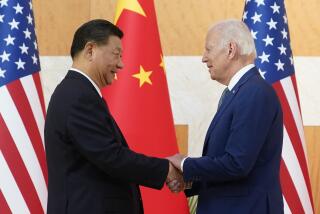Baker Visit to China on Hold Until Sale of Missiles to Syria Is Halted
- Share via
PARIS — China apparently failed Wednesday to fully satisfy U.S. conditions--including halting missile sales to Syria--to secure a Beijing visit by Secretary of State James A. Baker III, a visit the Chinese had sought for about a year.
A senior State Department official, after an hourlong meeting here between Baker and Chinese Foreign Minister Qian Qichen, deflected all questions about a Baker trip to Beijing in the near future. He said only that “both sides recognize that this (U.S.-China) is a relationship at some risk, yet it is a relationship that is very important to the interests of both sides.”
Baker, who has twice visited Mongolia without stopping in Beijing and who is to visit Japan and South Korea next month, wants China to curb arms proliferation and improve its human rights performance before committing to a trip there.
The Chinese are anxious for the Baker trip as a symbol of normalizing relations after the army crackdown on Tian An Men Square protesters two years ago, and particularly so as Washington moves toward reconciliation with China’s neighbors, Vietnam and Cambodia.
Baker and Qian met here on bilateral issues before they and representatives of 17 other nations joined in signing the Cambodian peace accord.
The United States also is looking for China to release some political prisoners and permit the Red Cross to visit them. While no apparent progress was made on those points, the Chinese have agreed to begin discussions aimed at limiting the export of products made by prisoners, the U.S. official said.
But the main U.S. concerns focus on arms issues. Washington wants China to adhere to the nuclear non-proliferation treaty, which bars transfer of nuclear weapons or know-how. China has hinted that it intends to sign the agreement. Asked about this Wednesday, Qian said, “The process is going on,” and he suggested vaguely that some move, apparently dealing with the treaty’s ratification, will begin this week.
More important, Washington wants Beijing to abide by the Missile Technology Control Regime, which limits exports of missiles with ranges of 190 miles or more. Qian and Baker only “considered discussions” on this issue, the senior U.S. official said.
China reportedly signed a 1988 deal to sell a solid-fuel missile, the M-9, to Syria when the weapon’s development is complete; none has been delivered so far. But the missiles, with a range of roughly 660 miles, are reportedly ready for export this year.
More to Read
Sign up for Essential California
The most important California stories and recommendations in your inbox every morning.
You may occasionally receive promotional content from the Los Angeles Times.












